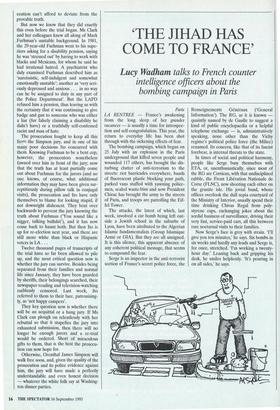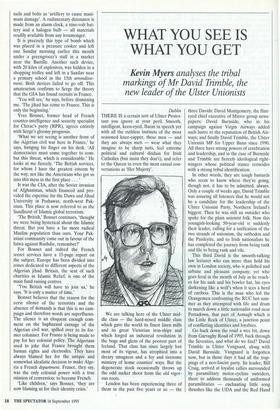THE JIHAD HAS COME TO FRANCE'
Lucy Wadham talks to French counter
intelligence officers about the bombing campaign in Paris
Paris LA RENTREE — France's awakening from the long sleep of her grandes vacances — is usually a time for introspec- tion and self-congratulation. This year, the return to everyday life has been shot through with the sickening effects of fear.
The bombing campaign, which began on 25 July with an explosion in the Paris underground that killed seven people and wounded 117 others, has brought the dis- turbing clutter of anti-terrorism to the streets: riot barricades everywhere, bands of fluorescent plastic blocking your path, parked vans stuffed with yawning police- men, sealed waste-bins and now President Chirac has brought the army to the streets of Paris, and troops are patrolling the Eif- fel Tower.
The attacks, the latest of which, last week, involved a car bomb being left out- side a Jewish school in the suburbs of Lyon, have been attributed to the Algerian Islamic fundamentalists (Group Islamique Arme or GIA). But they are all unsigned. It is this silence, this apparent absence of any coherent political message, that seems to compound the fear.
Serge is an inspector in the anti-terrorist section of France's secret police force, the Renseignements Generaux (`General Information'). The RG, as it is known quaintly named by de Gaulle to suggest a kind of public encyclopaedia or a helpful telephone exchange — is, administratively speaking, none other than the Vichy regime's political police force (the Milice) renamed. Its concern, like that of its fascist forebear, is internal threats to the state.
In times of social and political harmony, people like Serge busy themselves with ETA, or, unenthusiastically, since most of the RG are Corsican, with that undisciplined rabble, the Front Liberation Nationale de Corse (FLNC), now shooting each other on the granite isle. His jovial band, whose offices overlook the dull sepia courtyard of the Ministry of Interior, usually spend their time drinking Chivas Regal from poly- styrene cups, exchanging jokes about the sordid business of surveillance, driving their very fast, service-paid cars, all this between rare nocturnal visits to their families.
Now Serge's face is grey with strain. 'I'll give you ten minutes,' he says. Six bombs in six weeks and hardly any leads and Serge is, for once, stretched. 'I'm working a twenty- hour day.' Leaning back and gripping his desk, he smiles helplessly. 'It's pouring in on all sides,' he says. Is he referring to the paperwork, surveil- lance reports from RG offices all over the country, piling up on his desk, or to the terrifying impression that Muslim fanati- cism is pouring into France from the other side of the Mediterranean and that there is nothing he or anyone can do about it?
'We began tailing the Islamistes four years ago,' he says. 'Everyone called Pasqua paranoid or racist but thank God we did. Even then it was too late.'
Pasqua, France's former minister of interior, another Corsican and former spook, was famous for his disregard for legal minutiae when it came to Islamic fundamentalists. Immediately after the cancellation of the 1991 Algerian elections which would have brought the Islamic Sal- vation Front (FIS) to power, and the beginning of the civil war that has killed around 40,000 people, Pasqua requested a detailed RG report on the 5 million-strong Muslim community in France.
'It's out of date now. But it was essential work,' says Serge. 'We recruited informers outside mosques up and down the country. When the GIA [the armed wing of the FIS] began murdering French nationals in Algeria, we were ready to hit back.'
It was in September 1993, when two French geologists were found in the Alge- rian desert with their throats cut, that France was dragged into Algiers' dirty war on les Barbus (the bearded fundamental- ists). Pasqua responded by expelling from France imams accused of preaching anti- republican sermons. Dignitaries of the FIS were deported without trial to Third World countries.
In November 1993, L'Operation Cluysantheme (named by some morbid police chief after France's favourite funer- al flower) inaugurated a practice then widely criticised by all parties but the National Front. In dawn raids, Pasqua's men swept into Arab quarters in 20 departements and arrested 88 people. Only six were charged. There have been 12 such raids since, the latest of which was much more effective. Out of 140 people arrested, 76 were charged and 65 incarcer- ated.
Pasqua's tactics, applauded by his acquaintances in Algerian military intelli- gence, have since found widespread approval in France. If anyone doubted the wisdom of making a pact with a deeply corrupt government in Algiers — respon- sible for a debt of $25 billion and, even before the random butchery began, believed to practise political assassinations — the current bombing campaign has thrown France into the arms of the Algeri- an government.
'We get a lot of our information from Algerian intelligence,' says Serge wearily. 'We have to.'
How does he compare his task to that of the Special Branch with the IRA? Serge looks exasperated.
`There's no comparison. These groups are not structured like the IRA or ETA or any other Euro-terrorist groups we saw in the Seventies and Eighties. They're not pyramidal in structure, but lateral,' he says, passing his palm like a metal detector over his cluttered desk. 'So it makes them diffi- cult to dismantle. The terrorists never even see their commanders. They think their commander is Allah.' Serge smiles at the idea.
What worries the authorities is the threat of fundamentalist contagion among the French Muslims. In the latest wave of arrests, many of those detained were French-born Algerians.
`They're mostly thugs [voyous] and petty criminals who've been given a crash course in terrorism by the GIA,' says Serge. 'They've gone into France's bad suburbs and recruited ex-dealers, thugs, Beurs [sec- ond-generation Arabs] with no future.' pad suburbs' is a phrase for the immi- grant ghettos that have been abandoned by the police.) The six bombs have all been identified as the kind of 'poor man's bombs' frequently used by the GIA in Algeria. A video cas- sette circulating in France's immigrant sub- urbs features a GIA instructor explaining how to build such a bomb, with a gas cylin- der, stuffed with potassium chloride and nails and bolts as 'artillery to cause maxi- mum damage'. A rudimentary detonator is made from an alarm clock, a nine-volt bat- tery and a halogen bulb — all materials readily available from any ironmonger.
It is precisely this type of bomb which was placed in a pressure cooker and left one Sunday morning earlier this month under a greengrocer's stall in a market near the Bastille. Another such device, with 20 kilos of explosives, was hidden in a shopping trolley and left in a Sanilav near a primary school in the 15th arrondisse- ment, Both devices failed to go off. This amateurism confirms to Serge the theory that the GIA has found recruits in France.
`You will see,' he says, before dismissing me. 'The jihad has come to France. This is only the beginning.'
Yves Bonnet, former head of French counter-intelligence and security specialist for Chirac's party (RPR), agrees entirely with Serge's gloomy prognosis.
`What we are seeing is another front of the Algerian civil war here in France,' he says, banging his finger on his desk. 'All democracies must come together to com- bat this threat, which is considerable.' He looks at me fiercely. 'The British services, for whom I have the greatest esteem by the way, not like the Americans who got us into this mess in the first place . . . '
It was the CIA, after the Soviet invasion of Afghanistan, which financed and pro- vided the expertise for the Dawa and Jihad University in Peshawar, north-west Pak- istan. This place is now referred to as the Sandhurst of Islamic global terrorism.
`The British,' Bonnet continues, 'thought we were being hysterical about the Islamic threat. But you have a far more radical Muslim population than ours. Your Pak- istani community came out in favour of the fatwa against Rushdie, remember?'
For Bonnet and indeed the French secret services have a 15-page report on the subject. Europe has been divided into zones dedicated to different aspects of the Algerian jihad. Britain, the seat of such charities as Islamic Relief, is one of the main fund-raising centres.
'You British will have to join us,' he says. 'It is only a matter of time.'
Bonnet believes that the reason for the eerie silence of the terrorists and the absence of demands is that this is no cam- paign and therefore words are superfluous. The silence is an eloquent enough com- ment on the haphazard carnage of the Algerian civil war, spilled over to its for- mer coloniser. For France is being made to pay for her colonial policy. The Algerians used to joke that France brought them human rights and electrodes. They have always blamed her for the unique and somewhat idealistic decision to make Alge- ria a French department. France, they say, was the only colonial power with a true mission of conversion: to become French.
`Like children,' says Bonnet, 'they are now blaming us for their identity crisis.'




































































 Previous page
Previous page